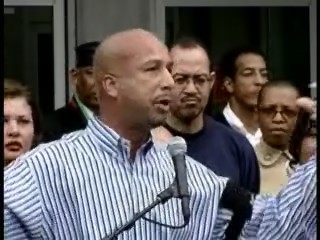
"In an era when America is still too divided by race and riches, Judge "Alioto" has not written one single opinion on the merits in favor of a person of color alleging race discrimination on the job. In fifteen years on the bench, not one."-TK
Michelle Malkin calls him out!This is, as the
Committee for Justice outlines, complete bull. Alito's
civil rights record:
Judge Alito repeatedly has ruled for plaintiffs in employment discrimination cases when the law calls for such outcomes.
* In Zubi v. AT&T Corp., 219 F.3d 220 (3d Cir. 2000), Judge Alito dissented from the majority's holding that a man who claimed he was fired because of his race could not sue in federal court. According to Judge Alito, the plaintiff was entitled to sue because a longer statute of limitations applied. The Supreme Court later vindicated Judge Alito's dissent. See Jones v. Donnelly & Sons Co., 541 U.S. 369 (2004).
* In Goosby v. Johnson & Johnson Medical, Inc., 228 F.3d 313 (3d Cir. 2000), a race and sex discrimination case, Judge Alito reversed the district court's decision to grant summary judgment to the defendant employer. The Third Circuit ruled that the plaintiff, a black woman, had introduced enough evidence to call into doubt the employer's explanation for why she was given lower-quality assignments.
* In Smith v. Davis, 248 F.3d 249 (3d Cir. 2001), an African-American probation officer brought a claim of race and disability discrimination in violation of Title VII and the Americans with Disabilities Act. Judge Alito joined a unanimous decision to reverse the lower court's grant of summary judgment for the defendant employer.
* Judge Alito's dissent in Sheridan v. DuPont, 100 F.3d 1061 (3d Cir. 1996) (en banc), is a principled balancing of the interests of employees and employers, and the Supreme Court later vindicated it.
* Judge Alito interpreted the Supreme Court's holding in a previous case as requiring that a Title VII plaintiff who produces certain evidence i.e., that the employer's stated reason for the employment decision was false should "usually" but not necessarily "always" be permitted to go to trial.
* The Supreme Court agreed with Judge Alito's Sheridan dissent in Reeves v. Sanderson Plumbing Products, Inc., 530 U.S. 133 (2000). Reeves was a unanimous opinion signed by Justice O'Connor whose seat Judge Alito is poised to take.
* In Bray v. Marriott Hotels, 110 F.3d 986 (3d Cir. 1997), Judge Alito would have affirmed the trial court's ruling for the employer because the plaintiff, an African-American woman, had failed to meet her burden of proof under relevant Supreme Court precedent.
* Marriott explained that it promoted a white female instead of the plaintiff because the white female had a higher objective employee rating, had superior experience, and had participated in more seminars and training sessions.
* Judge Alito argued that discrimination claims of require evidence of actual discrimination, not just evidence that an employer failed to comply with its own internal procedures.
* Judge Alito has held that prosecutors' efforts to exclude African-Americans from juries is unconstitutional discrimination.
* In Jones v. Ryan, 987 F.2d 960 (3d Cir. 1993), an African-American defendant was convicted in Pennsylvania court of robbery and criminal conspiracy; at trial, the prosecutor used peremptory challenges to exclude three African-Americans from the jury. Judge Alito joined a unanimous opinion holding that the prosecutor had discriminated against the potential jurors on the basis of race, and granting the defendant habeas relief.
* In Brinson v. Vaughn, 398 F.3d 225 (3d Cir. 2005), an African-American defendant was convicted of first-degree murder in Pennsylvania court and sentenced to life in prison. The prosecutor had used 13 out of 14 peremptory challenges against African-American potential jurors, and Judge Alito held that this pattern raised an inference of discrimination.



























